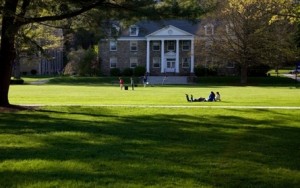Tuition rates seem to soar as enrollment drops. Staff suffers position cuts and Contemporary Contexts is discontinued. Students talk of the plummet of Houghton College as if momentary discouragement inevitably leads to downfall.
But according to studies of higher education in the rest of the country, Houghton simply stands as a participant in part of a larger trend, a number in a high percentage, and one that does not necessarily result in doom.

Many others echo the worry that those connected to Houghton College face. In a Huffington Post article, Cathy Sandeen wrote that the “vital liberal arts tradition is under attack;” Christopher Moraff of The Philadelphia Inquirer wrote of the decline of liberal arts degrees, saying, “Each year more students abandon the study of history, philosophy, English, and languages in favor of science, technology, engineering, and mathematics.”
In a “survey of 436 small private colleges and comprehensive state institutions,” The Chronicle of Higher Education found that “nearly half of the respondents said that they missed either their enrollment or their net-tuition-revenue goals.”
The survey also identified factors that may currently affect enrollment decline – the smaller the college, the more likely missing enrollment goals becomes; regional difficulties aided in more than half of small institutions in the Great Lakes region falling short of enrollment targets; competition surges as droves of colleges and universities work to recruit more students.
The fact that problems like low enrollment prove especially prominent at smaller institutions displays itself specifically at Houghton. As President Mullen said, “With schools that are less than 1,500 students, your margin for change in enrollment is much less – just 25 less students makes a huge difference.”
Though many four-year institutions lose appeal to lower-cost options like online courses or community colleges, many traditional higher education programs remain hopeful and endeavor to adjust.
An insert in this October’s first issue of The Chronicle of Higher Education, titled “A Special Report on the Future of Higher Education,” consists of articles considering such a trend. Throughout the various articles within, different reporters explain changes in institutions, both currently occurring and anticipated, among numerous traditional four-year colleges and universities that may better promote these institutions.
One such article entitled “Career Centers Stretch to Fill New Roles” discusses how multiple institutions recently started noting the importance of post-graduation success appeal, and began to modify to meet such a demand.
“A competitive job market, rising student-loan debt, and questions about the value of a degree have pressured colleges to prove that they are a good investment,” the report reads. “These forces, coupled with a growing body of research on the value of experiential learning, have led colleges to rethink how they prepare students for careers.”
It proceeds to note that many colleges notice such a trend and act upon it, most notably “liberal-arts-focused colleges,” to dissuade the mindset that a liberal arts degree is not marketable.
Houghton College, as a liberal arts institution, also finds value in such an interest. Mullen explained the college’s plan to improve its own career services, to gain appeal through “helping students translate their Houghton education into what comes afterward.”
Littering the media, higher education reviews and surveys, websites, and news about the seemingly deteriorating state of higher education can discourage, worry, and overwhelm those currently enrolled.
“What I think is really important,” said Mullen, “is that students realize that this is a revolution going on in higher education in our country, and what we need to be doing… is to think, ‘What does it mean to respond to this in a way that’s creative and powerful and that assures that we’re going to be able to have Houghton for decades to come?’”
